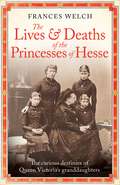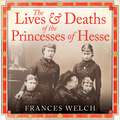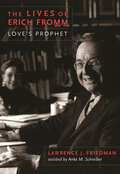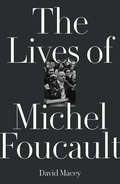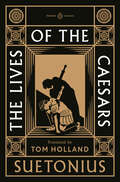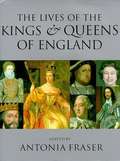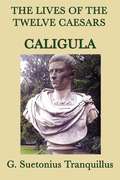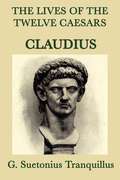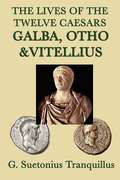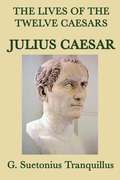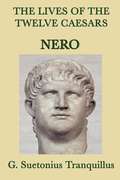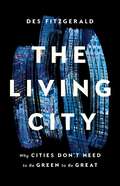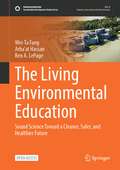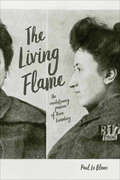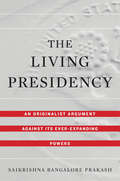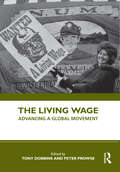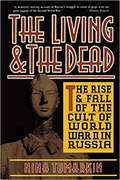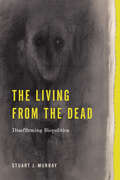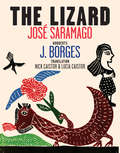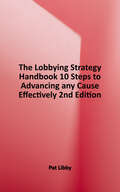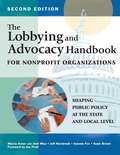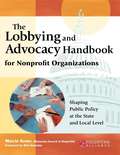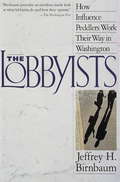- Table View
- List View
The Lives and Deaths of the Princesses of Hesse: The curious destinies of Queen Victoria's granddaughters
by Frances WelchA gripping family saga and a portrait of a world in turmoilThe Princesses of Hesse were Queen Victoria's grandchildren. After the sudden death of her daughter Alice, Queen Victoria took an obsessive interest in the marriage prospects of the four girls she left behind. Very little went according to plan. Fortunately, Queen Victoria did not live to see her direst fears for the girls spouses being realised. She died in January 1901, just before her beloved Hesse granddaughters became caught up in the maelstrom of early 20th century Europe. The youngest sister, Alix, married Tsar Nicholas II of Russia; she was assassinated, along with the rest of her family, in a cellar in Ekaterinburg. The second, Ella, married the Russian Grand Duke Serge. After he was assassinated, she became a nun, only to be assassinated by the Bolsheviks twenty-four hours after Alix in 1918. The third, Irene, married the Kaiser's brother, Prince Henry, and was entangled in the 1918 German uprisings. The eldest sister, Princess Victoria, married Prince Louis Battenberg, and became the mother of Lord Louis Mountbatten and grandmother of Prince Philip, Duke of Edinburgh.Their lives were all dramatic, and this group biography shows how they interacted as sisters, forever jostling for status and relaying the politics and intrigues that surrounded them. Drawing on hundreds of previously unseen letters from the sisters as well as from their grandmother Queen Victoria, The Princesses of Hesse takes us on a sweeping journey across the tumultuous landscape of the turn of the century - from the dramas of the Russian Court to the Russian Revolution, and through both World Wars in which they often found themselves on opposing sides.Both intimate and epic in scope, Frances Welch's biography sheds new light on the four sisters' lives, illuminating a remarkable period of history in the process.
The Lives and Deaths of the Princesses of Hesse: The curious destinies of Queen Victoria's granddaughters
by Frances WelchA gripping family saga and a portrait of a world in turmoilThe Princesses of Hesse were Queen Victoria's grandchildren. After the sudden death of her daughter Alice, Queen Victoria took an obsessive interest in the marriage prospects of the four girls she left behind. Very little went according to plan. Fortunately, Queen Victoria did not live to see her direst fears for the girls spouses being realised. She died in January 1901, just before her beloved Hesse granddaughters became caught up in the maelstrom of early 20th century Europe. The youngest sister, Alix, married Tsar Nicholas II of Russia; she was assassinated, along with the rest of her family, in a cellar in Ekaterinburg. The second, Ella, married the Russian Grand Duke Serge. After he was assassinated, she became a nun, only to be assassinated by the Bolsheviks twenty-four hours after Alix in 1918. The third, Irene, married the Kaiser's brother, Prince Henry, and was entangled in the 1918 German uprisings. The eldest sister, Princess Victoria, married Prince Louis Battenberg, and became the mother of Lord Louis Mountbatten and grandmother of Prince Philip, Duke of Edinburgh.Their lives were all dramatic, and this group biography shows how they interacted as sisters, forever jostling for status and relaying the politics and intrigues that surrounded them. Drawing on hundreds of previously unseen letters from the sisters as well as from their grandmother Queen Victoria, The Princesses of Hesse takes us on a sweeping journey across the tumultuous landscape of the turn of the century - from the dramas of the Russian Court to the Russian Revolution, and through both World Wars in which they often found themselves on opposing sides.Both intimate and epic in scope, Frances Welch's biography sheds new light on the four sisters' lives, illuminating a remarkable period of history in the process.
The Lives of Erich Fromm: Love's Prophet
by Lawrence FriedmanErich Fromm was a political activist, psychologist, psychoanalyst, philosopher, and one of the most important intellectuals of the twentieth century. Known for his theories of personality and political insight, Fromm dissected the sadomasochistic appeal of brutal dictators while also eloquently championing love—which, he insisted, was nothing if it did not involve joyful contact with others and humanity at large. Admired all over the world, Fromm continues to inspire with his message of universal brotherhood and quest for lasting peace.The first systematic study of Fromm's influences and achievements, this biography revisits the thinker's most important works, especially Escape from Freedom and The Art of Loving, which conveyed important and complex ideas to millions of readers. The volume recounts Fromm's political activism as a founder and major funder of Amnesty International, the National Committee for a Sane Nuclear Policy, and other peace groups. Consulting rare archival materials across the globe, Lawrence J. Friedman reveals Fromm's support for anti-Stalinist democratic movements in Central and Eastern Europe and his efforts to revitalize American democracy. For the first time, readers learn about Fromm's direct contact with high officials in the American government on matters of war and peace while accessing a deeper understanding of his conceptual differences with Freud, his rapport with Neo-Freudians like Karen Horney and Harry Stack Sullivan, and his association with innovative artists, public intellectuals, and world leaders. Friedman elucidates Fromm's key intellectual contributions, especially his innovative concept of "social character," in which social institutions and practices shape the inner psyche, and he clarifies Fromm's conception of love as an acquired skill. Taking full stock of the thinker's historical and global accomplishments, Friedman portrays a man of immense authenticity and spirituality who made life in the twentieth century more humane than it might have been.
The Lives of Michel Foucault
by David MaceyThe classic biography of the radical French philosopher with a new afterword by acclaimed Foucault scholar Stuart Elden.When he died of an AIDS-related condition in 1984, Michel Foucault had become the most influential French philosopher since the end of World War II. His powerful studies of the creation of modern medicine, prisons, psychiatry, and other methods of classification have had a lasting impact on philosophers, historians, critics, and novelists the world over. But as public as he was in his militant campaigns on behalf of prisoners, dissidents, and homosexuals, he shrouded his personal life in mystery.In The Lives of Michel Foucault -- written with the full cooperation of Daniel Defert, Foucault's former lover -- David Macey gives the richest account to date of Foucault's life and work, informed as it is by the complex issues arising from his writings. In this new edition, Foucault scholar Stuart Elden has contributed a new afterword assessing the contribution of the biography in the light of more recent literature.
The Lives of the Caesars (A Penguin Classics Hardcover)
by SuetoniusA masterful new translation of Suetonius' renowned biography of the twelve Caesars, bringing to life a portrait of the first Roman emperors in stunning detailA Penguin ClassicThe ancient Roman empire was the supreme arena, where emperors had no choice but to fight, to thrill, to dazzle. To rule as a Caesar was to stand as an actor upon the great stage of the world. No biographies invite us into the lives of the Caesars more vividly or intimately than those by Gaius Suetonius Tranquillus, written from the center of Rome and power, in the early 2nd century AD.By placing each Caesar in the context of the generations that had gone before, and connecting personality with policy, Suetonius succeeded in painting Rome&’s ultimate portraits of power. The shortfalls, foreign policy crises and sex scandals of the emperors are laid bare; we are shown their tastes, their foibles, their eccentricities; we sit at their tables and enter their bedrooms. The result is perhaps the most influential series of biographies ever written.That Rome lives more vividly in people's imagination than any other ancient empire owes an inordinate amount to Suetonius. Now award-winning author and translator Tom Holland brings us even closer in a new, spellbinding translation. Giving a deeper understanding of the personal lives of Rome&’s first emperors, and of how they swayed the fates of millions, The Lives of the Caesars is an astonishing, immersive experience of a time and culture at once familiar and utterly alien to our own.
The Lives of the Kings and Queens of England
by Antonia FraserUpdated with a new chapter on the Windsors, including the death of Diana, this reference offers a concise guide to the great dynasties of English royalty.
The Lives of the Twelve Caesars: Caligula
by G. Suetonias TranquillisThe Twelve Caesars, is a set of twelve biographies of Julius Caesar and the first 11 emperors of the Roman Empire written by Gaius Suetonius Tranquillus. The work, written in AD 121 during the reign of the emperor Hadrian, was the most popular work of Suetonius, at that time Hadrian's personal secretary, and is the largest among his surviving writings. The Twelve Caesars is considered very significant in antiquity and remains a primary source on Roman history.
The Lives of the Twelve Caesars: Claudius
by G. Suetonias TranquillisThe Twelve Caesars, is a set of twelve biographies of Julius Caesar and the first 11 emperors of the Roman Empire written by Gaius Suetonius Tranquillus. The work, written in AD 121 during the reign of the emperor Hadrian, was the most popular work of Suetonius, at that time Hadrian's personal secretary, and is the largest among his surviving writings. The Twelve Caesars is considered very significant in antiquity and remains a primary source on Roman history.
The Lives of the Twelve Caesars: Galba, Otho, Vitellius
by G. Suetonius TranquillusThe Twelve Caesars, is a set of twelve biographies of Julius Caesar and the first 11 emperors of the Roman Empire written by Gaius Suetonius Tranquillus. The work, written in AD 121 during the reign of the emperor Hadrian, was the most popular work of Suetonius, at that time Hadrian's personal secretary, and is the largest among his surviving writings. The Twelve Caesars is considered very significant in antiquity and remains a primary source on Roman history.
The Lives of the Twelve Caesars: Julius Caesar
by G. Suetonias TranquillisThe Twelve Caesars, is a set of twelve biographies of Julius Caesar and the first 11 emperors of the Roman Empire written by Gaius Suetonius Tranquillus. The work, written in AD 121 during the reign of the emperor Hadrian, was the most popular work of Suetonius, at that time Hadrian's personal secretary, and is the largest among his surviving writings. The Twelve Caesars is considered very significant in antiquity and remains a primary source on Roman history.
The Lives of the Twelve Caesars: Nero
by G. Suetonias TranquillisThe Twelve Caesars, is a set of twelve biographies of Julius Caesar and the first 11 emperors of the Roman Empire written by Gaius Suetonius Tranquillus. The work, written in AD 121 during the reign of the emperor Hadrian, was the most popular work of Suetonius, at that time Hadrian's personal secretary, and is the largest among his surviving writings. The Twelve Caesars is considered very significant in antiquity and remains a primary source on Roman history.
The Living City: Why Cities Don't Need to Be Green to Be Great
by Des FitzgeraldA sociologist explores why &“green cities&” won&’t fix everything—and urges us to celebrate urban life as it is Everywhere you look, cities are getting greener. The general assumption is clear: if something is unhealthy or bad about urban life today, then nature holds the cure. However, argues sociologist Des Fitzgerald, green spaces are not the panacea that people think. In The Living City, Fitzgerald tours the international green city movement that has flourished across the world and discovers the deep, sometimes troubling, roots of our desire to connect cities to nature. Talking to policy makers, planners, scientists, and architects, Fitzgerald suggests that underneath the wish to turn future cities green is another wish: to make the modern city, and perhaps the modern world, disappear altogether. Ultimately, he makes an argument for celebrating the contemporary city as it is—in all its noisy, constructed, artificial glory.
The Living Environment: Principles, Connections, And Solutions (12th edition)
by G. Tyler MillerThis textbook is an introduction to environmental science. It is an interdisciplinary science that uses concepts and information from natural sciences such as ecology, biology, chemistry, and geology and social sciences such as economics, politics, and ethics to (1) help us understand how the earth works, (2) learn how we are affecting the earth's life-support systems (environment) for us and other forms of life, and (3) propose and evaluate solutions to the environmental problems we face.
The Living Environmental Education: Sound Science Toward a Cleaner, Safer, and Healthier Future (Sustainable Development Goals Series)
by Wei-Ta Fang Ben A. LePage Arba'at HassanThis open access book is designed and written to bridge the gap on the critical issues identified in environmental education programs in Asian countries. The world and its environments are changing rapidly, and the public may have difficulty keeping up and understanding how these changes will affect our way of life. The authors discuss various topics and case studies from an Asian perspective, but the content, messaging, and lessons learned need not be limited to Asian cultures. Each chapter provides a summary of the intensive research that has been performed on pro-environmental behaviors, the experience of people working in industry and at home, and their philosophies that guide them in their daily lives. We highlight humanity’s potential to contribute to Sustainable Development Goals (SDGs) by understanding better the environmental psychology, social inclusion, and environmental sustainability and stewardship protection elements that contribute to responsible environmental citizenship. The content of the chapters in this book includes a discussion of the crucial issues, plans, and evaluations for sustainability theories, practices, and actions with a proposed management structure for maximizing the cultural, social, and ecological diversity of Asian experiences compared to other theories and cultures internationally. We intend that the data in this book will provide a comprehensive guide for students, professors, practitioners, and entrepreneurs of environmental education and its related disciplines using case studies that demonstrate the relationship between the social and behavioral sciences and environmental leadership and sustainability.
The Living Flame: The Revolutionary Passion of Rosa Luxemburg
by Paul Le BlancA collection of essays illuminating the historic Polish philosopher, economist, and activist&’s tremendous contributions to revolutionary struggle. Rosa Luxemburg, brilliant early twentieth century German revolutionary, comes alive in a rich set of essays on her life, ideas, and lasting influence. The essays deal not only with her remarkable contributions to political, social and economic theory, but also touch on her vibrant personality and intimate friendships. This collection, the fruit of more than four decades of involvement with Luxemburg's work, simultaneously showcases her penetratingly intellectual, political and deeply humanistic qualities.&“An indispensable contribution to our understanding of Rosa Luxemburg, who emerges as formidable theorist, principled activist, and above all, a fully realized human being . . . . The Living Flame affirms Luxemburg&’s lasting contribution and underscores the relevance of her legacy for our own, very different, age.&” —Helen Scott, author, The Storm of History: Shakespeare&’s Tempest and Capitalism &“A profound and multidimensional investigation of a giant thinker and revolutionary. These [essays] show meticulous historical and theoretical attentiveness and at the same time are hugely timely; a significant contribution to Rosa Luxemburg studies and Marxist theory and history.&” —Dana Mills, author, Rosa Luxemburg: Critical Lives &“Uncommonly nuanced, probing, and also deeply principled explorations. [Le Blanc&’s] mode of engagement nicely compliments that of Rosa Luxemburg and shows us her thoughts as a living and breathing work in progress, not merely echoes from an increasingly distant past. In addition, Le Blanc models how Marxists and Leftists in general might want to relate to one another when we debate complex issues and at times disagree.&” —Axel Fair-Schulz, associate professor at SUNY Potsdam
The Living Presidency: An Originalist Argument against Its Ever-Expanding Powers
by Saikrishna Bangalore PrakashA constitutional originalist sounds the alarm over the presidency’s ever-expanding powers, ascribing them unexpectedly to the liberal embrace of a living Constitution. Liberal scholars and politicians routinely denounce the imperial presidency—a self-aggrandizing executive that has progressively sidelined Congress. Yet the same people invariably extol the virtues of a living Constitution, whose meaning adapts with the times. Saikrishna Bangalore Prakash argues that these stances are fundamentally incompatible. A constitution prone to informal amendment systematically favors the executive and ensures that there are no enduring constraints on executive power. In this careful study, Prakash contends that an originalist interpretation of the Constitution can rein in the “living presidency” legitimated by the living Constitution. No one who reads the Constitution would conclude that presidents may declare war, legislate by fiat, and make treaties without the Senate. Yet presidents do all these things. They get away with it, Prakash argues, because Congress, the courts, and the public routinely excuse these violations. With the passage of time, these transgressions are treated as informal constitutional amendments. The result is an executive increasingly liberated from the Constitution. The solution is originalism. Though often associated with conservative goals, originalism in Prakash’s argument should appeal to Republicans and Democrats alike, as almost all Americans decry the presidency’s stunning expansion. The Living Presidency proposes a baker’s dozen of reforms, all of which could be enacted if only Congress asserted its lawful authority.
The Living Wage: Advancing a Global Movement
by Tony DobbinsAs wealth inequality skyrockets and trade union power declines, the living wage movement has become ever more urgent for public policymakers, academics, and – most importantly – those workers whose wages hover close to the breadline. A real living wage in any part of the world is rarely its minimum wage: it is the minimum income needed to cover living costs and participate fully in society. Most governments’ minimum wages are still falling short, meaning millions of workers struggle to cover their living costs. This book brings new, vital insights to the conversation from a carefully selected group of contributors at the forefront of this field. By juxtaposing advances across sectors and countries, and encompassing many different approaches and indeed definitions of the living wage, Dobbins and Prowse offer a rich tapestry of approaches that may inform public policy. By including the experiences and voices of those workers earning at, or near, the living wage alongside the opinions of leading experts in this field, this book is a pioneering contribution for public policymakers as well as students and academics of work and employment relations, public policy, organizational studies, social economics, and politics.
The Living and the Dead: The Rise and Fall of the Cult of World War II in Russia
by Nina TumarkinThis eye-opening book shows how Communist state and party authorities stage-managed the Soviets' memory of World War II, transforming a national trauma into a heroic exploit that glorified the party while systematically concealing the disastrous mistakes and criminal cruelties committed by the Stalinist tyranny.
The Living from the Dead: Disaffirming Biopolitics (RSA Series in Transdisciplinary Rhetoric)
by Stuart J. MurrayIn a society that aims above all to safeguard life, how might we reckon with ethical responsibility when we are complicit in sacrificial economies that produce and tolerate death as a necessity of life?Arguing that biopower can be fully exposed only through an analysis of those whom society has “let die,” Stuart J. Murray employs a series of transdisciplinary case studies to uncover the structural and rhetorical conditions through which biopower works. These case studies include the concept of “sacrifice” in the “war” against COVID-19, where emergent cultures of pandemic “resistance” are explored alongside suicide bombings and military suicides; the California mass hunger strikes of 2013; legal cases involving “preventable” and “untimely” childhood deaths, exposing the irreconcilable claims of anti-vaxxers and Indigenous peoples; and the videorecording of the death of a disabled Black man. Murray demonstrates that active resistance to biopower inevitably reproduces tropes of “making live” and “letting die.” His counter to this fact is a critical stance of disaffirmation, one in which death disrupts the politics of life itself.A philosophically nuanced critique of biopower, The Living from the Dead is a meditation on life, death, power, language, and control in the twenty-first century. It will appeal to students and scholars of rhetoric, philosophy, and critical theory.
The Lizard
by Jose SaramagoA story by Nobel Prize-winning writer Jose Saramago, gorgeously illustrated in woodcuts by one of Brazil's most famous artists.When a lizard appears in the neighborhood of Chiado, in Lisbon, it surprises passers-by, and mobilizes firefighters and the army. With a clear and precise style, the fable offers a multitude of senses, reaching audiences of all ages. "The Lizard" is a short story included in A Bagagem do Viajante (1973), a volume that brought together the Saramago chronicles for the newspaper A Capital and the weekly Jornal do Fundão between 1971 and 1972. Translated by Nick Caistor and Lucia Caistor, The Lizard, is an illustrated version of the chronicle by J. Borges.
The Lizard Strategy
by Valerio VaresiItaly's Maigret returns in another smouldering noir from a master of the police procedural "A master storyteller" Barry Forshaw, IndependentParma is blanketed in snow, but this pristine, white veneer cannot mask the stench of corruption. Its officials are no longer working for its people - only for themselves - crime is out of control and resentment festers in every district. Commissario Soneri remains at heart an idealist, so the state of Parma wounds him more than most. And now he is presented with three mysteries at once, each more impenetrable than the last. In a river creek on the outskirts of the city, tipped off by a local, he finds a mobile phone that rings through the night but holds no data; an elderly patient with senile dementia is reported missing from a hospice; and the mayor of Parma, who was reported as taking a holiday on the ski slopes, has disappeared off the face of the earth - just when he seemed certain to be implicated in a seismic corruption scandal at city hall.
The Lobbying Strategy Handbook: 10 Steps to Advancing Any Cause Effectively
by Pat LibbyThis handbook demonstrates how those who are passionate about a cause can successfully advocate at the state and local levels. Pat Libby's 10-step strategic model walks the reader through the essential elements of conducting a lobbying campaign from start to finish. This framework is illustrated by four case studies - and accompanying campaign materials - that show how groups of real students successfully used the 10-step model to pass significant laws. The 10-step model is bracketed by an explanation of how to effectively use technology in lobbying campaigns, and guidance about what to do once a bill has passed. Undergraduate, graduate students, and anyone interested in making a difference, can use the book to guide them in creating and conducting a grassroots campaign from start to finish.
The Lobbying and Advocacy Handbook for Nonprofit Organizations (Second Edition)
by Marcia Avner Josh Wise Jeff Narabrook Jeannie Fox Susie Brown Jon PrattThe Lobbying and Advocacy Handbook for Nonprofit Organizations, Second Edition, is your complete road map to shaping public policy at the state and local level. It gives detailed, step-by-step instructions for developing an effective plan and putting it into action. With this handbook, you will discover how lobbying can help fulfill your mission; learn how to initiate, support, or defeat bills; develop effective lobbying skills; gather and mobilize support for your positions; learn how to use the media effectively; influence gov't administrators to back your policy positions; comply with state and federal regulations; and set up systems in your nonprofit to support lobbying. In addition to updated worksheets, case studies, and resources, new material in the second edition includes nonprofit civic engagement and voter mobilization; designing the Policy Committee that works for your nonprofit; utilizing social media in your communications strategies; administrative advocacy: working with governmental agencies; and understanding the why, what and how of collaboration.
The Lobbying and Advocacy Handbook for Nonprofit Organizations: Shaping Public Policy at the State and Local Level
by Marcia AvnerThe author provides broad scope of information and road map for nonprofit lobbying at the state and local level.
The Lobbyists
by Jeffrey BirnbaumJeffrey H. Birnbaum's The Lobbyists exposes the world of Washington's most influential players -- the more than eighty thousand who descend upon our national government, informing and bartering with Congress and blocking legislation on behalf of the richest business interests in the country. This acclaimed work -- now with a new introduction that analyzes the changes in lobbying in 1990s -- provides a shocking view of how our government really works.
